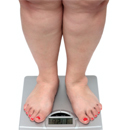Healthy Eating: Throw OUT the Diets
I'm excited about my new way of looking at eating. I've decided to totally eliminate the concept of "bad" foods. I refuse to feel guilty if and when I splurge. And so far I've resisted the impulse to buy every tabloid that highlights a new fad diet modeled by a svelte, bikini-clad starlet.
I didn't always have such a healthy attitude toward food, though. I admit, at some point in my life, I may have made some of these familiar statements:
- "I'm on a diet and shouldn't have any treats. Eating during the holidays is like navigating landmines."
- "I'm going out tonight. I'd better starve now to prepare for a big meal later."
- "I'm sticking with my diet foods all the way...then I know I'm good."
- "I am so glad I didn't break down and have a cookie. Instead I had a ton of good food."
- "I'm getting thin for the holiday party. I'll do whatever it takes to wear that new dress/suit."
Do those words sound as if they could have come from you or someone you know? I hear these and others just like them in my office every day.
Hot off the press: We're DONE with the guilt, deprivation, and discouragement that come from unattainable goals. For good. For real.
Let's talk about the basic, biological state of hunger. Do you know when you are really, truly hungry, as opposed to bored, depressed, stressed, rushed, or under pressure? Most of us don't because we haven't listened to our inborn signals. We've pushed them off, then overindulged, starting a cycle of hunger, guilt, stress, shame--and more overeating. Get the picture? If you've thought about starving yourself so that you'll fit into that holiday party dress, it's practically guaranteed that you'll either be as uncomfortable as a sausage, or you'll lose the weight only to put it right back on, and then some. The negative cycle always seems to continue.
The Fullness Scale is a great tool to help you get in touch with your food needs. Here's how it works:
1. Visualize a scale from 0 (starving) to 10 (stuffed). Rate your hunger. Keep a food journal, and add your ratings throughout the day, if you like.
2. Interpret your rating:
- If you are a 0 or 1, you are too hungry and are in danger of overeating at your next meal or even throughout the rest of the day. Try never to go without food so long that you reach this point. Once you do, your body will think it's starving and will hold on to every single calorie for dear life.
- If you rate your hunger a 2, 3, or 4, it's time to eat. Continue eating only until your self-rating is a 6 or 7. This can be tricky to gauge, so don't eat straight through to the end of your meal. In the middle of your lunch or dinner, actually put down your fork and take a pause. Think carefully about how you feel. Where are you on the hunger scale? If you really are still hungry, keep on eating. If not, think about stopping now.
To determine your fullness level, consider how you feel after your meal and rate yourself for a third time. Are you a 6 or 7? Right on. If you're a 9 or 10, you're probably feeling stuffed, or worse, sick, and you've just gotten some good information about what it feels like to override your satiety cues. It's uncomfortable--you won't do it next time. (Notice there is no self-bashing in this discussion! Instead, it's about learning to listen to our bodies.)
Now it's time to ask yourself, "What do I really like to eat?" Surprisingly perhaps, many of us actually don't know. Make a list: What texture or feel (crunchy, creamy, chunky, soft, cold), intensity (spicy, mild, robust, light, rich), and taste (salty, pungent, sweet, tart) do you want in your food? Choose to include these types of foods in your diet to ensure that you will be satisfied. If you don't, you might end up eating lots of other foods--along with hundreds of needless calories--that you really don't want in search of that one food experience. Is it worthwhile continuing to avoid that desired food indefinitely? Nadda chance.
Not giving in to the self-recriminations that come from strict diets and their downfalls will allow you to learn to respect your body, for both its good points and the negatives. I haven't met anyone yet who totally loves everything about his/her body, but I have had the pleasure of meeting some individuals who have successfully made peace by choosing healthy imperfection over unrealistic, overly restrictive diet rules.
Armed with good information about your own food attitudes and preferences, you'll be at a good starting point to take positive steps. Begin today, for when you feed your body well, you also feed your soul.
-
Majority of weight loss occurs via breathing
Although it is often pushed to the side during the festive rush,
-
The Biology Behind the Size of Your Behind
The new year always seems to bring about the urge to get in shape - a
-
A Pleasurable Dieting And Weightloss Experience
Tired of the same old dos and dont when it comes to dieting and weight
-
3 Fat Burning Tips You Must Practice To Lose Weight
Of all the relevant fat burning tips there are a handful that you must
-
Self Confidence With Hypnosis
You have been sitting in the room, knowing the solution to the concern
-
The Fundamental Facts Of Weight Loss Surgery
Individuals, who have looked fleshiness since long and have assayed s
- DON'T MISS
- Incentives To Lose Weight - 5 Life-Altering Reasons To Get Into Shape
- Have Your Mocha And Fat Loss Too
- Blame It On Iodine
- On A Diet Ensure You Get Enough Nutritional Supplements For Your Good Health
- The Fastest Way to Lose Weight Permanently
- The Weight Loss Program Which Is Fun To Implement
- I Lost Weight: Brad Swenson Found A Sustainable Diet Plan And Lost 200 Pounds
- Portion Control - The Right Amount of Food
- How to Burn Fat with Fat
- Making Lifestyle Changes For Permanent Weight Loss




